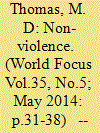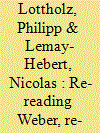| Srl | Item |
| 1 |
ID:
139940


|
|
|
|
|
| Publication |
New Delhi, Navrang, 1986.
|
| Description |
171p.hbk
|
| Standard Number |
817013037X
|
|
|
|
|
|
|
|
|
|
|
|
Copies: C:1/I:0,R:0,Q:0
Circulation
| Accession# | Call# | Current Location | Status | Policy | Location |
| 027288 | 954.04506/MAN 027288 | Main | On Shelf | General | |
|
|
|
|
| 2 |
ID:
128547


|
|
|
| 3 |
ID:
130796


|
|
|
|
|
| Publication |
2014.
|
| Summary/Abstract |
Ethics and Indian civilization, political thought; global implication is a valid search into the global implications of the ethics grounded in the national ethos of the ideological, political, religious, social and cultural dimensions of the great civilization the word India stands for.
|
|
|
|
|
|
|
|
|
|
|
|
|
|
|
|
| 4 |
ID:
153894


|
|
|
|
|
| Summary/Abstract |
This article analyzes how different interpretations of Max Weber’s work on the state and legitimacy have materialized in contemporary research on—and practice of—international state-building. We argue that the currently prevailing neo-Weberian institutionalism in state-building theory and practice is based on a selective interpretation of the passionate and polemicist ‘politician’ Max Weber, whilst omitting almost entirely the wealth of thought on interpretivist method and the anti-foundationalist approach to social sciences that he has developed in his scholarly work. The neo-Weberian institutionalist approach thus focuses almost exclusively on state capacity and institutions. In contrast to this restricted approach, we will show how Weber’s work on the historical and cultural dimensions of legitimacy is instructive in understanding the emergence and consolidation of social orders. Research agendas embracing such perspectives offer a viable way forward from the securitized approach to state-building and international intervention, in the process moving beyond the neo-Weberian orthodoxy.
|
|
|
|
|
|
|
|
|
|
|
|
|
|
|
|